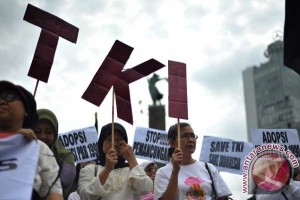ILO encourages RI to better protect its migrant workers
Thu, May 9 2013 09:39 |
To protect its migrant workers abroad, Indonesia can refer to the ILO document on multilateral framework on labour migration non-binding principles and guidelines for a rights-based approach to labour migration.
"In the past two decades, Indonesia has become one of the world`s biggest migrant worker suppliers. Therefore, migrant workers are important part of the Indonesian manpower that the government must protect by among others benefiting from bilateral and multilateral agreements," ILO Deputy Director for Indonesia Michiko Miyamoto said here on Wednesday.
As the world`s second largest migrant worker supplier, Indonesia every year sends around 700 thousand migrant workers abroad, particularly to East Asia, Southeast Asia and the Middle East. Nearly 78 percent of the migrant workers are employed as domestic helpers, she said.
"Although the migrant domestic helpers are Indonesia`s second foreign exchange earner, many of these "foreign exchange heroes" suffer from exploitation and torture during migration process, both in Indonesia and abroad," she said.
According to her, ILO will continue to campaign for the protection of migrant workers.
To protect its migrant workers abroad, she said Indonesia can refer to the ILO document on multilateral framework on labour migration non-binding principles and guidelines for a rights-based approach to labour migration.
Meanwhile, ILO Program Coordinator on Migrant Workers Albert Y. Bonasahat expressed hope that the governments of all ILO member states including Indonesia will be able to develop a mechanism to monitor their citizens employed as migrant workers abroad.
"We hope the Indonesian government will also continue its efforts to develop a mechanism of protecting its migrant workers," he said.
It is sometimes difficult to monitor migrant workers since most of them are employed at private residences as domestic helpers, he said.
After all, the government must ensure that they are protected and receive their rights, he said.(*)
Editor: Heru
__._,_.___
| Reply via web post | Reply to sender | Reply to group | Start a New Topic | Messages in this topic (1) |
http://groups.yahoo.com/group/batavia-news
to Subscribe via email :
batavia-news-subscribe@yahoogroups.com
----------------------------------------
VISIT Batavia News Blog
http://batavia-news-networks.blogspot.com/
----------------------------
You could be Earning Instant Cash Deposits
in the Next 30 Minutes
No harm to try - Please Click
http://tinyurl.com/bimagroup
--------------
to Subscribe via email :
batavia-news-subscribe@yahoogroups.com
----------------------------------------
VISIT Batavia News Blog
http://batavia-news-networks.blogspot.com/
----------------------------
You could be Earning Instant Cash Deposits
in the Next 30 Minutes
No harm to try - Please Click
http://tinyurl.com/bimagroup
--------------
.
__,_._,___

No comments:
Post a Comment